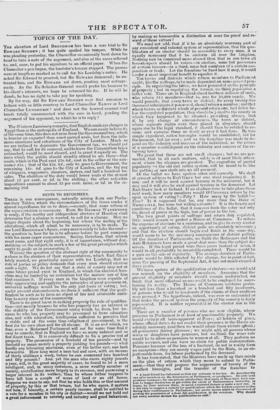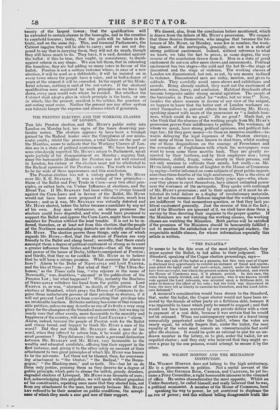HINTS TO REFORMERS.
THERE is one consequence, naturally, arising frOm our Parka- smentary Tables, which the circumstances of the times render it almost superfluous for ns. to draw,—namely, that some reform of the representation is necessary. Even Sir GEORGE WARHENDER is ready, if the Worthy and independent electors of Honiton. shall determine that a change is wanted, tocall for a change. . Men no longer dispute about the beginning, but where 'the ending of the alterations; which all admit to be necessary, is to be made: To use Lord BROUGHAM'S figure, every Man is ready to take the road---L the question is, how far he is to advance before he part company With his more eager companions. -Seeing, therefore, that reform must come, and that right early, it is of importance, without dog- matizing on the subject-, to mark a few of the great principles which
ought to guide us in prosecuting it. . .
Waiving the question of the abstract right of the community to aeshare in the election of their representatives, which '1?.arl. GREY lately mooted, we practically concur with his Lordship, -that no ride justice 'Or policy demands that every man should exercise such a right. We do not say that a state of society may not at some future period exist in England, in which the electoral fran- chise may be limited by nOyestriction but the mature, age of him that exercises it. Ifevery man in the kingdom were capable of duly appreciating and applying the principles of good governmsnt, universal suffrage would be the only just. basis of voting ; but, under present circumstances, we deem it sufficient that the quali- fication be such .as to form an object of fair and attainable ambi-
tion to every class of the community. . .
There is no great harm in making property the rule of qualifica- tion—not merely because he who has property has an interest in the stability of the Government under Which lie lives, but be- cause he who has property may be presumed t6 have education also, and with education, intelligence Sufficient to perceive that a stable and at the same time enlightened government, is the best for his own class and for all classes. It is an evil Which, we fear, even a Reformed Parliament will not for some time find it easy to remedy, that in England we have so many indirect and so few direct taxes. It is excessively .difficult to fix . a. precise test of property. The possession of a 'freehold of ten pounds—and by freehold we mean merely a property yielding ten pounds—i3 what hardly any labouring mechanic, even of the better sort, can look forward to. How long must a man toil and save, with an income of thirty -shillings a week, before he can command two hundred and fifty pounds ? • And, yet the man who earns eighty pounds a year, will, in the great majority of cases, be found to. be a more intelligent, and, in many instances, a more wealthy member of society, cOntrIbuting; more largelyto its 'revenue, and possessing larger interest in its welfare,- than he Whose .father happens to have left him a couple of acres of land or an old house. Suppose we were to say, not that he who holds this or that amount of property, by this or that tenure, but he who earns, it matters not how, if honestly, a certain yearly income, shall be entitled .to a vote for a member in his city or district—would we not hold out a great inducement to sobriety and industry and good behaviour, by making so honourable a distinction at once the proof and re-. ward of these virtues ?
We need not add, that if it be an absolutely necessary part of any consistent and rational system of representation, that the qua- lification of an elector- should . be accessible to every man, it is equally necessary that it be uniform all over the kingdom. Nothing can be conceived more absurd than that in one town all housekeepers should be voters—in another, none but possessors of certain tenures—in a third, none but members of a certain cor- poration or trade. Let the franchise be fixed how it may, it would confer a most important benefitto equalize it. , The towns and districts which return members to Parliament ought, like the suffrage, to be made dependent on some general prin- ciple. In regulating the latter, we have proceeded on the principle of property ; -but in regulating the former, we thinkPopulatiom a better rule. There are in England about fourteen millions of souls, who return 513 members—that is, one for 28,006 nearly. We would provide, that every town or district, for every twenty-five thousand inhabitants it possessed, should return a member; and that where towns or districts which at present return one, had fallen be- low the regulated population, they should be j.)ined to the county in which they happened Jo be situated ; pr,.■viding always, that if, by any change of circumstances, the town or district, whose separate rights were thus placed in abeyance, should again rise to the legal standard, it should then be entitled to re- slime and exercise them as freely as ever it had dune. By this simple expedient, rotten boroughs would be annihilated, not for the moment, but for ever ; and as the franchise was made to de- pend on the industry and success of the individual, so the return of a' member would depend on the industry and success of the re- turning, town.
'We grant that these are not small changes ; but we are per- suaded, that in all such matters, safety is of most likely attain- ment where the changes are greatest. The engrafting of partial popularity the old and rotten system, will be found to belike the putting of new cloth into an old garment.
Of the ballot we have spoken often and earnestly. We shall at present address to Earl GREY but one Ivord respecting it. It may and it will be used against tyranny in the aristocrat, but it May and it will also be Used against tyranny in the democrat. Let Earl Getty look at Ireland. If an election were to take place there next week, how many members would ,O'CoNerste return by the open system of voting ?-..Fifty ? IlLiw many by the ballot ?— Pive ? Is it supposed that he, any more than The Duke or NEWCASTLE, has none but willing servants ? It is the beauty and excellence of the ballot, that it removes .froiti the Voter not only the dread of power in the high, but of power in the low.
The two great points of suffrage and return duly regulated, little. would remain to perfect a House of Commons. To reduce the expense of elections to a.minimum, and to give to every elector an opportunity of VOting, district polls are alisOlutely necessary.; and that the election should begin and finish in the same day, would seem to be 'the necessary consequence of district polling. Of the duration of Parliaments, we think the Reformers and the Anti-Reformers have made a great deal more than the subject de- serves. If the legal period were three years instead of seven, it would in all probability be invariably completed. There would be again on the .side of regnlar:ty. The average duration of Parlia- ments would be little affected by the change, for in point of fact, since the passing of the Septennial Act, it has not much exceeded
three years. • •
. We have spoken of thaqualification of electors—we would add one remark On 'the eligibility of* members. Assuming- that the present' eligibility of members should remain undisturbed, we think that more effectual means ought to be employed for ascer- taininfr' reality. The house of. Commons Contains prOba- bly not less than a hundred or a hundred and fifty insolvents, or persons who would be insolvents if the claims of their 'creditors were pressed.* No hypothesis, indeed, was ever so unfounded as that under the present. sy§tein the property of the country is flUrly represented. It is neither represented in the elector ,nor in the elected.
There are a number of persons who arc now eligible, whose presence in Parliament is at least of questionable propriety. 'We would exclude all heirs-apparent of Peers ; all holders of place, whose official duties do not render their presence in the House ab- solutely necessary (and then we would admit them virtute officii); all pensioners during pleasure ; we might add, all persons whose wives or daughters have pensions, but we think the wiser rule would be to allow no pensions to women at all. They perform no public services, and can have no claim for public remuneration. Pensions because of the loss of a husband, do not in reality form an exception—they are merely wages paid by the State, in an- ob- jectionable form, for labour performed by the deceased. It has•beenstated, that the Ministers have made up their minds on the plan of reform which they, mean to submit to Parlia- ment,—that they will .propose the 'suppression of twenty of the smallest bisroughs, and the transfer of the franchise: to * A legal friend has informed us that our estimate is too low. He describes the run alter members, on the dissolution of Parliament, as prodigious. He adds (and produces instances, for our private satisfaction) that many of these have been con- tent to beggar themselves to get within the circle of Parliamentary immunity, in hopes, by their services there, to mend a battered fortune or make a new one. , It is not easy to suggest a remedy for qualifications which the holders contrive to lose during their continuance in Parliament ; but surely means might be discovered of proving the possession of a bond fide qualification at the entrance. Why should not every member declare his qualification on oath twenty of the largest towns ; that the qualification will be extended to certain classes in the boroughs, and in the counties to copyhold tenures ; lastly, that the polls will be taken in dis- tricts, and on the same day. This, and triennial Parliaments, the Cabinet imAgine they will be able to carry; and we are not dis- posed to say that in carrying them, they will not do much, though they still leave much to do. They have, it is said, decided against the ballot : if this be true, they ought, in consistency, to decide against reform in any shape. We can tell them, that in extending the franchise, they are but adding so many votes in favour of the ballot. Preston is not a solitary instance where, in case of a new election, it will be used as a shibboleth ; it will be insisted on in every town where the people have a voice, and in half-a-dozen of years atthe utmost it will be conceded. In the report of the Minis- terial scheme, nothing is said of the out-voters. If the electoral qualification were regulated by such principles as we have laid down, every man would vote where he resided. But whether the Cabinet shall adopt a plan in which principle is the basis, or one in which, like the present, accident is the arbiter, the practice of out-voting must cease. Neither the present nor any other system can tolerate longer the expense and abuses which it generates.



























 Previous page
Previous page